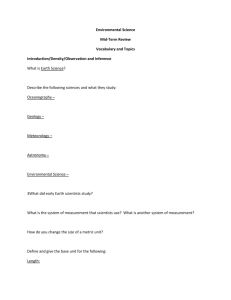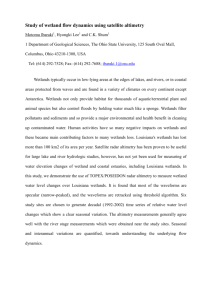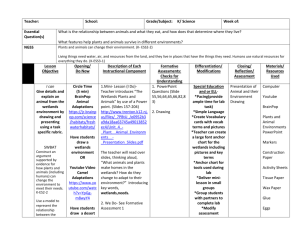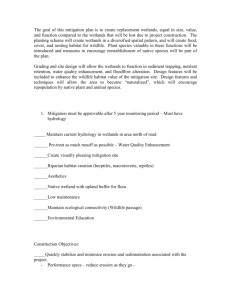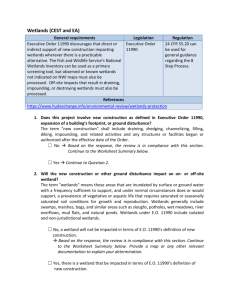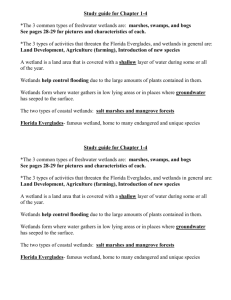California Wetlands
advertisement
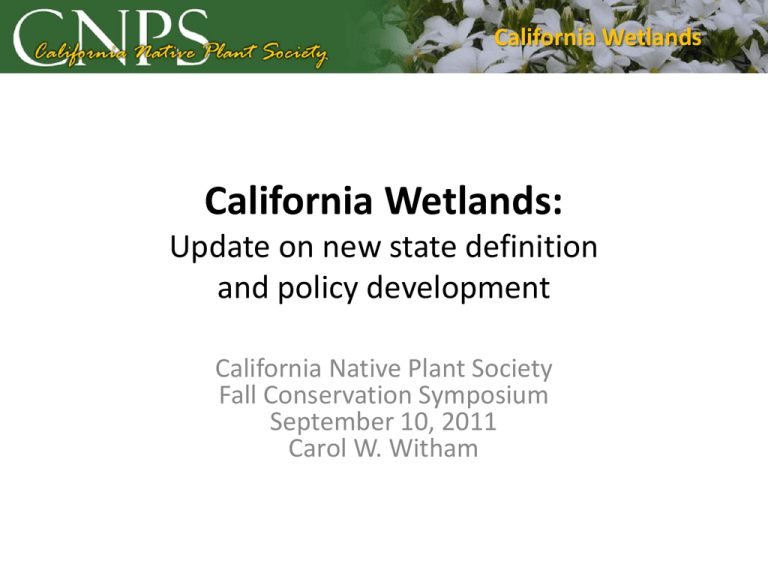
California Wetlands California Wetlands: Update on new state definition and policy development California Native Plant Society Fall Conservation Symposium September 10, 2011 Carol W. Witham California Wetlands Waters and Wetlands: Federal Laws • • • • • • • • 1899: Rivers and Harbors Act 1912: Public Health Services Act 1924: Oil Pollution Act 1948: Water Pollution Control Act 1965: Water Quality Act 1972: Water Pollution Control Amendments 1977: Clean Water Act (CWA) 1987: Water Quality Act California Wetlands CWA Nexus to Plant Conservation • 558 of 2258 plants (24.7%) currently listed in the Online Inventory are associated with wetland habitats… – Bogs & fens (62) – Meadows & seeps (316) – Marsh & swamps (135) – Playas (38) – Vernal pools (97) – Riparian (82) California Wetlands Basics of the Federal CWA • Purpose is to limit pollutants to surface waters – Requires permits for discharge, dredge and fill – Applies to interstate, navigable waters and associated wetlands • Interstate broadly interpreted to apply to commerce • Navigable and associated also broadly interpreted – Broad exemptions for agricultural practices • States must certify that permits do not violate the state’s water quality control standards California Wetlands Legal Interpretation of the Federal CWA • Lower court decisions all over the map on interpretation of key terms • Supreme Court decisions… – 1985: Riverside Bayview Homes • Upheld jurisdiction over adjacent wetlands – 2001: Solid Waste Agency of North Cook County (SWANCC) • Rejected jurisdiction over isolated wetlands – 2006: Rapanos • Requires that a wetland have significant nexus to navigable waters California Wetlands California Laws • 1928: Amendments to the Constitution • 1949: Dickey Water Pollution Act • 1969: Porter-Cologne Water Quality Control Act – State Water Resources Control Board has ultimate say over state water quality policy – Nine Regional Water Quality Control Boards issue waste discharge requirements (WDRs), initiate enforcement, and monitor local water quality • Create basin plans to ensure reasonable protection of beneficial uses and prevent nuisance California Wetlands Intersection of CWA and Porter-Cologne • States have ultimate authority for implementation of the CWA with respect to water quality (Sections 401 & 402) – The California Supreme Court held that the state can impose restrictions more stringent than those required under the CWA (City of Burbank 2005) • States may assume administration of the Section 404 permit program for wetlands – Must develop a wetlands permit program similar to the Federal program California Wetlands California Wetland Regulation • 2003: Report on Regulatory Steps Needed • 2004: Filling the Gaps Workplan – Also beefed up waste discharge requirements • • • • • 2007: Scoping Meetings on Policy Alternatives 2008: SWRCB Resolution 2008-2011: Public and Stakeholders Meetings 2011: Notice of Preparation for DEIS 2011: Five Year Coordinated Work Plan California Wetlands Wetlands and Riparian Area Protection Policy (WRAPP) • Phase 1 – establish a policy to protect wetlands from dredge and fill activities – Develop a wetland definition – Establish a regulatory mechanism based on Federal permitting program – Establish a standard monitoring and assessment methodology • Phase 2 – expand policy to protect wetlands from other activities impacting water quality • Phase 3 – expand policy to protect riparian areas California Wetlands Current Status of WRAPP • Phase 1 in progress… – Definition mimics Federal law • Three parameter definition (hydrology, soils & vegetation) based on the Arid West Supplement – Permitting steps similar to Federal law • LEDPA preference: 1) avoidance, 2) minimization and then 3) mitigation with some exceptions – California Rapid Assessment Method (CRAM) monitoring methods developed • Modules being developed for various wetland types California Wetlands Current Status of WRAPP (cont) • Phase 1 in progress (cont)… – NOP for DEIS issued in January 2011 • CNPS participated with a consortium of environmental organizations to provide comments on the NOP – Five Year Workplan issued in April 2011 • Joint SWRCB/DFG document that lays out responsibilities for developing policy and implementation • Phase 2 on indefinite hold • Phase 3 on indefinite hold California Wetlands Next Steps… Questions? References • Wetland and Riparian Area Protection Policy – www.swrcb.ca.gov/water_issues/programs/cwa401/wrapp.shtml • State Assumption of Section 404 Permit Program – www.epa.gov/owow/wetlands/facts/fact23.html
